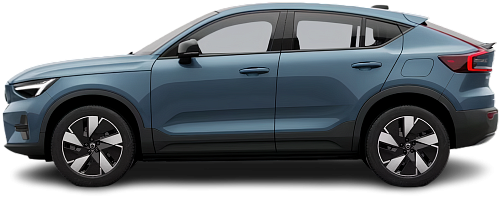Global EV Comparison: Volvo C40 Recharge (EC40) Twin Pure Electric vs Nissan Ariya 87 kWh AWD 290 kW
Struggling to Decide? Let AI Help!
Your AI Summary Is Ready!
General Info
The Nissan Ariya 87 kWh e-4ORCE AWD 290 kW (2023-…) is currently produced, it has a starting price of . The Volvo C40 Recharge (EC40) Twin Pure Electric (2021-2022) has been discontinued. You can find it for as low as €36900 on the used car market.
The two vehicles share the same body style: SUV.
| Property | Volvo C40 Recharge (EC40) Twin Pure Electric | Nissan Ariya 87 kWh AWD 290 kW |
|---|---|---|
| Years of Production | 2021-2022 | 2023-… |
| Current Status | Discontinued | Produced |
| Country of Manufacture | Belgium | Japan, China |
| Body Style | SUV | SUV |
| Market Availability | EU, USA | EU, USA |
| Price Europe (Used) | €36900 | €53980 |
| GCC Score | 6.4 | 6.5 |
Range and Efficiency
The Nissan Ariya 87 kWh e-4ORCE AWD 290 kW (2023-…) boasts a greater real-world range, a larger battery, and superior energy efficiency compared to the Volvo C40 Recharge (EC40) Twin Pure Electric (2021-2022).
| Property | Volvo C40 Recharge (EC40) Twin Pure Electric | Nissan Ariya 87 kWh AWD 290 kW |
|---|---|---|
| Range (EPA) | 364 km | 438 km |
| Range (WLTP) | 449 km | 507 km |
| Range (GCC) | 362 km | 432 km |
| Battery Capacity (Nominal) | 78 kWh | 91 kWh |
| Battery Capacity (Usable) | 75 kWh | 87 kWh |
| Efficiency per 100 km | 20.7 kWh/100 km | 20.1 kWh/100 km |
| Efficiency per kWh | 4.83 km/kWh | 4.97 km/kWh |
| Range and Efficiency Score | 5.4 | 6.5 |
Charging
Both vehicles utilize a standard 400-volt architecture.
The Volvo C40 Recharge (EC40) Twin Pure Electric (2021-2022) offers faster charging speeds at DC stations, reaching up to 150 kW, while the Nissan Ariya 87 kWh e-4ORCE AWD 290 kW (2023-…) maxes out at 130 kW.
The Nissan Ariya 87 kWh e-4ORCE AWD 290 kW (2023-…) features a more powerful on-board charger, supporting a maximum AC charging power of 22 kW, whereas the Volvo C40 Recharge (EC40) Twin Pure Electric (2021-2022) is limited to 11 kW.
| Property | Volvo C40 Recharge (EC40) Twin Pure Electric | Nissan Ariya 87 kWh AWD 290 kW |
|---|---|---|
| Max Charging Power (AC) | 11 kW | 22 kW |
| Max Charging Power (DC) | 150 kW | 130 kW |
| Architecture | 400 V | 400 V |
| Charge Port | CCS Type 2 | CCS Type 2 |
| Charging Score | 6.4 | 6.5 |
Performance
Both vehicles are all-wheel drive.
The Volvo C40 Recharge (EC40) Twin Pure Electric (2021-2022) boasts greater motor power and accelerates faster from 0 to 100 km/h.
| Property | Volvo C40 Recharge (EC40) Twin Pure Electric | Nissan Ariya 87 kWh AWD 290 kW |
|---|---|---|
| Drive Type | AWD | AWD |
| Motor Type | PMSM (front), PMSM (rear) | EESM (front), EESM (rear) |
| Motor Power (kW) | 300 kW | 290 kW |
| Motor Power (hp) | 402 hp | 389 hp |
| Motor Torque | 660 Nm | 600 Nm |
| 0-100 km/h | 4.7 s | 5.1 s |
| Top Speed | 180 km/h | 200 km/h |
| Performance Score | 5.5 | 5.5 |
Dimensions
The Nissan Ariya 87 kWh e-4ORCE AWD 290 kW (2023-…) is longer and taller, but about the same width as the Volvo C40 Recharge (EC40) Twin Pure Electric (2021-2022).
The Nissan Ariya 87 kWh e-4ORCE AWD 290 kW (2023-…) boasts a more extended wheelbase.
| Property | Volvo C40 Recharge (EC40) Twin Pure Electric | Nissan Ariya 87 kWh AWD 290 kW |
|---|---|---|
| Length | 4440 mm | 4595 mm |
| Width (with Mirrors) | 2034 mm | 2172 mm |
| Width (w/o Mirrors) | 1873 mm | 1850 mm |
| Height | 1596 mm | 1660 mm |
| Wheelbase | 2702 mm | 2775 mm |
Cargo and Towing
The Nissan Ariya 87 kWh e-4ORCE AWD 290 kW (2023-…) provides more cargo capacity, featuring both a larger trunk and more space with the rear seats folded.
A frunk (front trunk) is available in the Volvo C40 Recharge (EC40) Twin Pure Electric (2021-2022), but the Nissan Ariya 87 kWh e-4ORCE AWD 290 kW (2023-…) doesn’t have one.
The Volvo C40 Recharge (EC40) Twin Pure Electric (2021-2022) is better suited for heavy loads, offering a greater towing capacity than the Nissan Ariya 87 kWh e-4ORCE AWD 290 kW (2023-…).
| Property | Volvo C40 Recharge (EC40) Twin Pure Electric | Nissan Ariya 87 kWh AWD 290 kW |
|---|---|---|
| Number of Seats | 5 | 5 |
| Curb Weight | 2132 kg | 2259 kg |
| Cargo Volume (Trunk) | 404 l | 408 l |
| Cargo Volume (Max) | 1205 l | 1280 l |
| Cargo Volume (Frunk) | 31 l | - Cargo Volume (Frunk) |
| Towing Capacity | 1800 kg | 1500 kg |
| Cargo and Towing Score | 6.4 | 6.8 |




